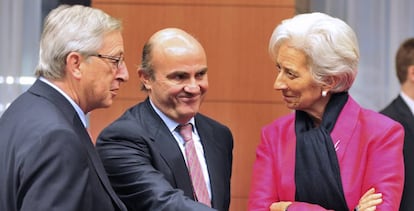IMF softened its 2012 report on Spain to reduce alarm
The global financial institution changed its description of the economy from “bleak” to “very difficult” to avoid rattling the markets and triggering apocalyptic media headlines

In July 2012, Spain was struggling through its third straight year of recession since the beginning of the crisis in 2008. A staff team from the International Monetary Fund (IMF) wrote a report describing the outlook for the eurozone’s fourth largest economy as “bleak.” But the final document instead used the more neutral “very difficult.”
EL PAÍS has had access to records of the meeting of July 26, 2012 at which IMF officials reviewed the Spain Staff Report for the 2012 Article IV Consultation ahead of publication. These records show how the world body toned down its views on Spain in its Key Issues section and in various others parts of the report.
The goal was not to change the report’s message. The text is honest about the risks
Martin Mühlesein, IMF official
Some members of the Executive Board criticized these changes, saying they violated the IMF’s transparency policy. But another one denied that the changes were substantial, and said they were justified so as not to rattle the markets and give material to reporters anxious to exaggerate the Fund’s message.
The exchange of opinions among IMF officials shows how certain expressions in the report were softened to avoid generating even more alarm at a time when Spain was cause for great concern in Europe. The country was in the grip of a deep crisis and Brussels had approved a bailout of its banking sector only a month earlier. The risk premium – the extra yield investors demand to hold Spanish 10-year bonds rather than similar-maturity German securities – had soared from 300 to 550 basis points, and the Bankia debacle was viewed as a threat to the entire eurozone.
Some IMF board members voiced concern at the changes in the country report, records of the meeting show. “The Board insists on the importance of warning countries about the risks, but these warnings have been considerably reduced,” said Brazil’s Jose Pedro Fachada, an executive director at the IMF. This member added that, in line with the agency’s transparency policy, the only information that may be deleted is information that is not in the public domain, which was not the case here.
Some members of the board criticized these changes, saying they violated the IMF’s transparency policy
Another executive director, Thanos Catsambas, disagreed with Fachada and said “our chairman thought the corrected version was more appropriate.”
Martin Mühleisen, director of the Strategy, Policy and Review Department, added that “the goal was not to change the report’s message. The text is honest about the risks.” He said that the changes were justified because of the markets’ sensitivity, and warned that the original wording could be misinterpreted by the public.
One of the biggest sources of debate was the word “bleak,” originally used to describe the outlook for Spain. “I don’t want to argue over a word. But [in the change to ‘very difficult’] procedures were not followed. This does not comply with the transparency policy,” said Mühlesein.
The records of the meeting also show IMF officials discussing the possibility of a full bailout for Spain, mirroring the situation in Greece, Ireland and Portugal.
English version by Susana Urra.
Tu suscripción se está usando en otro dispositivo
¿Quieres añadir otro usuario a tu suscripción?
Si continúas leyendo en este dispositivo, no se podrá leer en el otro.
FlechaTu suscripción se está usando en otro dispositivo y solo puedes acceder a EL PAÍS desde un dispositivo a la vez.
Si quieres compartir tu cuenta, cambia tu suscripción a la modalidad Premium, así podrás añadir otro usuario. Cada uno accederá con su propia cuenta de email, lo que os permitirá personalizar vuestra experiencia en EL PAÍS.
¿Tienes una suscripción de empresa? Accede aquí para contratar más cuentas.
En el caso de no saber quién está usando tu cuenta, te recomendamos cambiar tu contraseña aquí.
Si decides continuar compartiendo tu cuenta, este mensaje se mostrará en tu dispositivo y en el de la otra persona que está usando tu cuenta de forma indefinida, afectando a tu experiencia de lectura. Puedes consultar aquí los términos y condiciones de la suscripción digital.









































